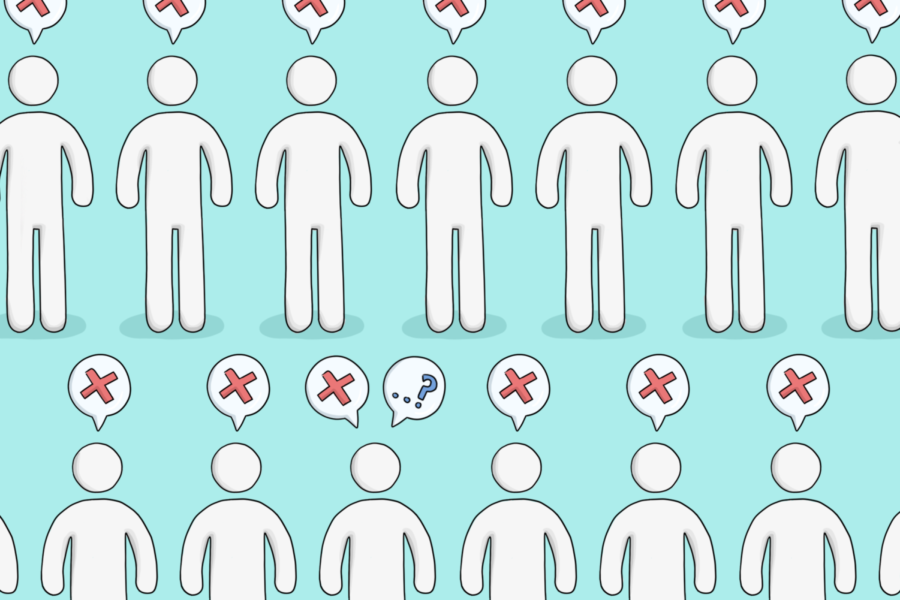Blindly agreeing to hate harms: importance of believing in what’s right
Bandwagon hate has become a common trend in today’s society. The Sidekick staff writer Shravya Mahesh discusses her views on the matter and the reasons it may be occurring more.
October 31, 2018
When Taylor Swift took to Instagram on Oct. 7 to encourage people to vote, the people on the internet both applauded and criticized her for her sudden political involvement.
I was more interested in the sheer number of people who claimed Swift was “uncanceled” or admitted they never disliked her.
The hate itself is no surprise – the young singer has faced a rocky couple of years full of controversy and romantic drama, her reputation tarnished to the point where she penned an entire album to prove herself innocent. Yet those who hated without reason remained a mystery to me.
This kind of hate is rampant in modern media, with thousands of instances just a mere Twitter search away. For example, people openly voice their distaste for Scarlett Johansson due to her frequent whitewashed roles, though the amount of say she gets in the issue is debatable. While many have logical, thought-out reasons for hating on people or things, too many just agree with everyone else on their opinions.
Much of politics is based around bandwagon hating. It is never wrong to voice dissonance between two beliefs, but when the hate reaches superficial things, such as hairstyle and speech, this behavior comes off as juvenile.
This is not a new phenomenon. Much of the racism and prejudice in history is a result of bandwagon hate. Few held a personal grudge against those targeted, yet the prevalent belief at the time was skewed.
“We know [these stereotypes] to not be true, but [due to] fear [and] ignorance, that [becomes] the negative bandwagon,” Coppell High School AP Psychology teacher Kristia Leyendecker said. “With any sort of racism, sexism, religionism or other -ism you want to call it, they’re all impacted negatively by a bandwagon.”
This can work the other way around as well, rather than the “-ism”s being impacted by the hate.
“Bandwagon hate is a hard thing to quantify because we [only] see the results,” CHS U.S. History teacher Kevin Casey said. “But racism is certainly the genesis of bandwagon hate.”
Today, our platform for self-expression is much more easily accessible due to the internet, so we see every instance where someone voices their dislike and overestimate how many people share that opinion.
I cannot lie and say I am innocent. I am guilty of mocking people along with others, of disliking unpopular things without a reason, of snickering along with others at someone I barely know. After all, if everyone else is, surely I should too, right?
That thought is what manifests in our minds before we laugh along with everyone else or blindly agree. But why do we bandwagon hate at all?
Personally, as well as for many people may age, I do it to fit in.
“Perhaps if [teenagers] are challenged on their thoughts and feelings that are contrary to the rest of the group, they fear they’re not going to be able to stand up for themselves or to be able to defend their position,” Leyendecker said. “It’s so much easier to go along to get along.”
When my friends rant about people I barely know, I somehow laugh along and agree. My personal fear of being ostracized kicks in and suddenly I’m saying something I don’t really believe in.
“Some people very passionately drive people up [when they state their opinion, so I agree] because this person has such a passion and reason [for believing what they do],” CHS junior Tejasvini Tummuru said. “I just get caught up in other people’s passion.”
For others, it is culture. If a particular belief, albeit negative, is held by a family through generations, it is difficult to lose that mindset.
The only way to combat it is to stand up for what we individually believe. It may seem daunting to disagree with those who disagree with our beliefs, but we must remain confident what we believe is right and educate those around us.
Maybe then we would live in a more amenable society where we would feel comfortable to express our dissenting opinions.
Maybe then, instead of an excess of bandwagon hate, we can have an abundance of bandwagon love.











